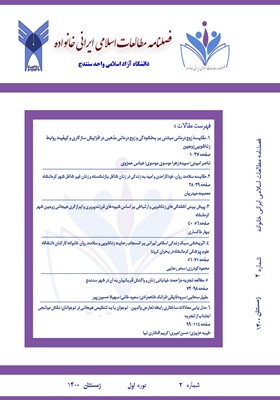مقایسه سلامت روان، خودکارآمدی و امید به زندگی در زنان شاغل بازنشسته و زنان غیر شاغل شهر کرمانشاه
محورهای موضوعی : مطالعات اسلامی ایرانی خانواده
1 - استادیار، گروه روانشناسی بالینی، واحد کرمانشاه، دانشگاه آزاد اسلامی، کرمانشاه، ایران
کلید واژه: Employment, Life expectancy, Self-efficacy, mental health, retired,
چکیده مقاله :
هدف: این پژوهش با هدف مقایسه سلامت روان، خودکارآمدی و امید به زندگی در زنان شاغل بازنشسته و زنان غیر شاغل شهر کرمانشاه طراحی و اجرا گردید. روش: مطالعه حاضر از نوع توصیفی و علّی- مقایسه ای بوده که در سال 1398 با مشارکت 200 نفر از زنان شهر کرمانشاه (100 نفر از زنان شاغل بازنشسته و 100 نفر از زنان غیر شاغل)انجام شد. نمونه های مورد مطالعه به شیوه نمونه گیری در دسترس انتخاب و تعداد نمونه با استفاده از فرمول کوکران 200 نفر برآورد شد. یافته ها: یافته های نشان داد که سلامت روان در کلیه شرکت کنندگان از وضعیت مطلوبی برخوردار نبود. هر دو گروه خودکارآمدی خوبی داشتند. این در حالیست که میزان امید به زندگی در زنان غیر شاغل کمتر از حد مطلوب و این مقدار در زنان شاغل بازنشسته مطلوب به نظر می رسید. سلامت روان، خودکارآمدی و امید به زندگی در زنان شاغل بازنشسته به شکل معناداری بیشتر از زنان غیر شاغل بود (p<0.001). نتیجه گیری با توجه به اهمیت دوره سالمندی و افزایش تعداد سالمندان، پیشنهاد می شود امکانات ویژه ای از جمله تشکل های سالمندی مرتبط با نیازهای سالمندان، برنامه ریزی جهت برگزاری دوره های آموزشی با محوریت سلامت روان در نظر گرفته شود تا جامعه با آمادگی بیشتری به استقبال این پدیده برود و از بسیاری از مشکلات دوره سالمندی پیشگیری شود. همچنین فراهم کردن همکاری های اجتماعی زنان و کارآفرینی متناسب با وضعیت و شان زنان و تسهیل تعامل بین کار و زندگیِ خانوادگی توصیه می شود.
Introduction: the present study designed and conducted to compare mental health, self-efficacy and life expectancy in retired women and non-employed women in Kermanshah. Methods: The present study was a descriptive and causal-comparative study with the participation of 200 people (100 retired women and 100 non-employed women) in Kermanshah in 2019. Results: Kolmogorov-Smirnov test showed that the distribution of scores in the population was normal for the research variables. Mental health was not good for all participants. Both groups had good self-efficacy. However, the life expectancy of non-employed women was lower than desired, and this figure seemed desirable in retired employed women. Findings of the present study showed that mental health, self-efficacy and life expectancy were significantly higher in retired women than in non-employed women (p<0.001). Conclusion: The findings of this study showed that retired women have better mental health status than non-employed women. Due to the positive and significant relationship between life expectancy and social support and the dimensions of family, friends and colleagues and, due to the high level of social support in working people, increasing life expectancy in retired women makes sense to non-employed women. Considering the relationship between employment and mental health, planning to hold training courses focusing on mental health, creating agencies on ageing, strengthening women's social cooperation and appropriate entrepreneurship can be considered to prevent many ageing problems.
_||_


